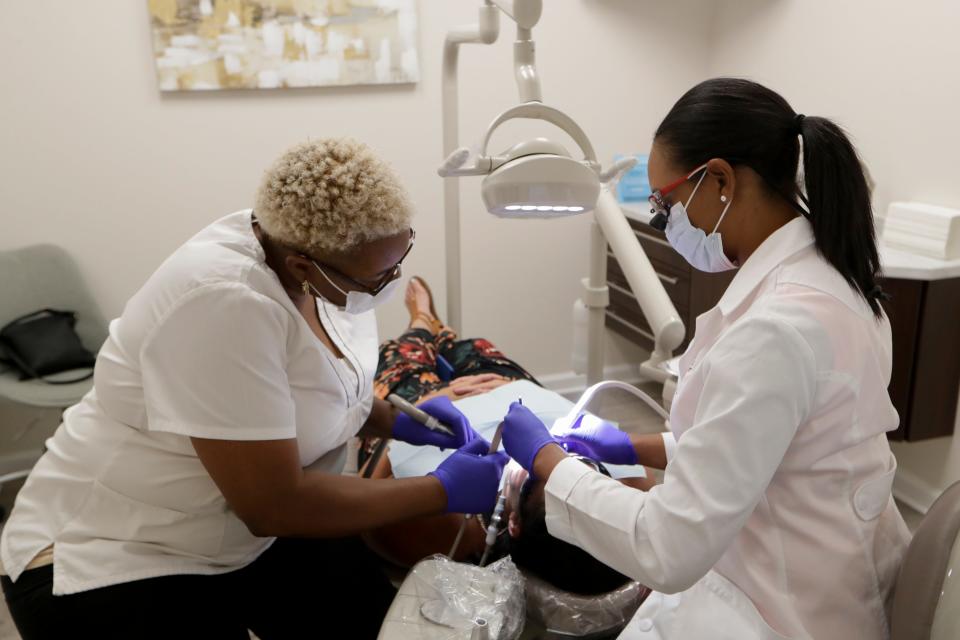Keep a healthy smile: Take charge of your dental and gum health

In past columns, I have provided an overview of periodontal (gum) disease and shared links for more detailed information. Today's column reiterates the ongoing impact of this disease and looks at symptoms, diagnosis and treatment as well.
As someone who has been affected by issues related to receding gums, I am well aware of the importance of the potential for gum disease to affect our entire body’s health. Knowledge about the issue, along with ways to prevent it (and treat it, when necessary), can go a long way towards a healthy lifestyle, and consequently, a better quality of life.
A 2020 educational seminar at Westminster Oaks in Tallahassee addressed the importance of dental (oral) health for the rest of our body. Local periodontist and guest presenter Dr. William Colon provided some “basics” on the value of periodontal (gum) health to our overall well-being.
Heat dangers: Blasting past Firecracker 5K: Hot summer running days are here again | Yon
Reducing risks on the road: Tips for driving safely and responsibly | Mahoney
Eating smarter, living longer: Diet can boost health, longevity | Mahoney

Periodontal (or gum) disease is the most common disease in the United States. According to Colon, 64.7 million adults nationally over 30 have gum disease. In Florida, 47.2% of the adult population (some 7 million adults over age 30) has periodontal disease, while 70.1% of those over 65 years suffer from gum disease.
Gum disease is easily prevented. But when left untreated, it can lead to devastating effects well beyond tooth loss.
A periodontist is a dentist who specializes in the prevention, diagnosis and treatment of periodontal disease, and in the placement of dental implants. Periodontists are also experts in the treatment of oral inflammation: perio.org.

Overview
Periodontal disease is an infection of the tissues that hold your teeth in place. It's typically caused by poor brushing and flossing habits that allow plaque — a sticky film of bacteria — to build up on the teeth and harden. In advanced stages, periodontal disease can lead to sore, bleeding gums, painful chewing problems and even tooth loss.
Causes
Our mouths are full of bacteria. These bacteria, along with mucus and other particles, constantly form a sticky, colorless “plaque” on teeth. Brushing and flossing help get rid of plaque. Plaque that is not removed can harden and form “tartar” that brushing doesn’t clean. Only a professional cleaning by a dentist or dental hygienist can remove tartar.
There are a number of risk factors for gum disease, but smoking is the most significant. Smoking also can make treatment for gum disease less successful. Other risk factors include diabetes, hormonal changes in girls and women, diabetes, medications that lessen the flow of saliva, certain illnesses, certain medications and genetic susceptibility.
Symptoms
Symptoms of gum disease include:
Bad breath that won’t go away
Red or swollen gums
Tender or bleeding gums
Painful chewing
Loose teeth
Sensitive teeth
Receding gums or longer appearing teeth

Diagnosis
At a dental visit, a dentist or dental hygienist will:
Examine your gums and note any signs of inflammation.
Use a tiny ruler called a “probe” to check for and measure any pockets around the teeth. In a healthy mouth, the depth of these pockets is usually between 1 and 3 millimeters. This test for pocket depth is usually painless.
Ask about your medical history to identify conditions or risk factors (such as smoking or diabetes) that may contribute to gum disease.
The dental professional may also:
Take an X-ray to see whether there is any bone loss.
Refer you to a periodontist. Periodontists are experts in the diagnosis and treatment of gum disease and may provide you with treatment options that are not offered by your dentist.
Treatment
The main goal of treatment is to control the infection. The number and types of treatment will vary, depending on the extent of the gum disease. Any type of treatment requires that the patient keep up good daily care at home. The dentist may also suggest changing certain behaviors, such as quitting smoking, as a way to improve your treatment results.
Helpful tips
You can keep your gums and teeth healthy by:
Brushing your teeth twice a day with a fluoride toothpaste.
Flossing regularly to remove plaque from between teeth. Or, you can use a device such as a special brush, wooden or plastic pick, or a “water flosser” recommended by a dental professional.
Visiting the dentist routinely for a check-up and professional cleaning.
Quitting smoking.
Except in unusual cases, you can help prevent gum disease by brushing twice a day and cleaning between your teeth with floss or an interdental cleaner once a day. Avoiding tobacco use and practicing other healthy measures, such as eating a balanced diet, are important in preventing periodontal disease.
Work with your dentist and dental hygienist to discover how best to handle your chronic medical problems. There is no cure for serious gum or periodontal disease, known as periodontitis, but it can be prevented and controlled by good oral hygiene habits, nutrition, a functional bite, and by not smoking.
Resolve to take control of this potentially serious disease through proactive measures.
Thanks to the NIH, Dr. Colon and the Fight Gum Disease website for much of the content provided here.
Some additional resources
An informative booklet on periodontal (gum) disease providing valuable information on causes, symptoms and treatment published by the National Institutes of Health (NIH) is available for downloading at nidcr.nih.gov.
For additional general information on how gum disease can affect total body health go to fightgumdisease.com.

Mark Mahoney served as a Peace Corps Volunteer for over four years in Latin America, has been a Registered Dietitian/Nutritionist (R.D.N.) for over 35 years and completed graduate studies in Public Health at Columbia University. He can be reached at marqos69@hotmail.com.
This article originally appeared on Tallahassee Democrat: Keep your gums healthy. Your entire body will thank you

